Anka Leśniak
works
biography texts contact
2026
2025
2024
2023
2022
2021
2020
2019
2018
2017
2016
2015
2014
2013
2012
2011
2010
2009
2008
2007
2006
2004
WORKS 2015
EUGENIA IS GETTING MARRIED
Eugenia is taking a wife
installation, performance, photography
2 Drukarska Street, Lodz
the Invisible inVisible project /Polish version/
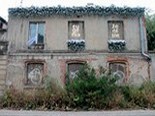
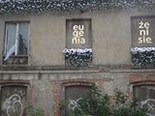
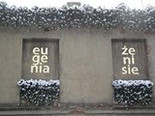
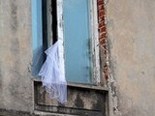
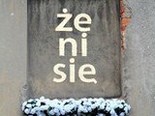
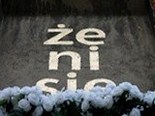
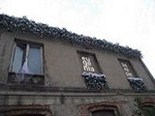
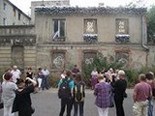
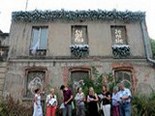
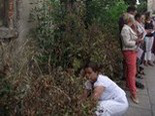

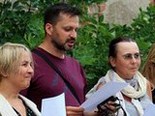
The installation is inspired by the extraordinary story of Eugenia Steinbart, a prewar inhabitant of the Baluty district in Lodz. Eugenia pretended to be a man in order to gain a better paid job. This kind of masquerade lead to problems with the law, as well as leading to complications in her personal life. Eugenia, reportedly at the instigation of Joanna Ogrodnik who also convinced her to adopt a male disguise, got married ... as a man. The hoax was not discovered by Eugenia's wife but by the police when Eugenia was arrested on suspicion of blackmail.
It is unclear whether her intention to pretend to be a man was entirely dictated by practical considerations. Maybe there was a theatrical element expressed by her reluctance to subdue to stereotype? Or maybe Eugenia was a victim of psychological violence imposed on her by other... women. If we assume that Eugenia was just a crook and manipulator, how we can explain her suicide attempt? Eugenia's story reveals the complex personality of a seemingly simple girl from the Bałuty.
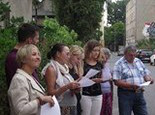
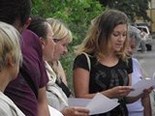

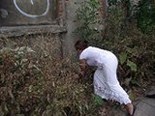

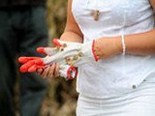
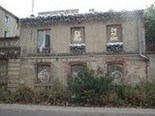
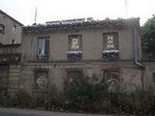
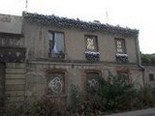

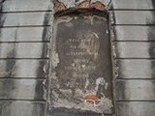

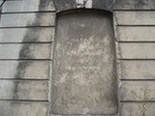


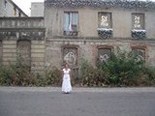
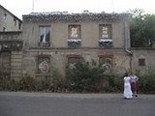
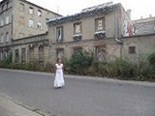
The elements of the installation are: an abandoned building, white flowers, gilded letters, inscriptions scratched in plaster and a veil. A title of the installation is a kind of play on words in Polish. The term "żeni się", which we can approximately translate as "taking a wife" is not the correct term in relation to a woman who is getting married, but it is often used in everyday speech. Sometimes it is a slip of the tongue - lapsus linguae, sometimes such a mistake stems from the shortcomings in education in the native language, but it could be also a mistake made a by a foreigner speaking Polish. Or maybe "ożeniła się" (she took a wife) which could be a kind of Freudian mistake ...
The inadequacy of ordinary language in relation to the linguistic rules of the offical language can be seen as an interesting aspect of Lodz which was a highly ethnically diverse city in the past. The word "żeni" also refers to a pet name for the name Eugenia - "Żenia" – a polonised version of the French name "Eugénie".
The installation is also an attempt to increasingly build a visual narrative of associations and meanings around the story of Eugenia. One aspect is the mysteriousness of this character. We do not know much about her. Her story is too complicated to be interpreted in a one-dimensional way. Inability to obtain confirmed information combined with curiosity, creates a great scope for the imagination, which has both its good and bad sides.
Trying at all costs to piece together the fragments of the story, we begin to see relationships ... and suddenly everything connects to each other and as one idea stems from the next, the coincidences cease to be accidental and all the facts arrange in a credible theory.
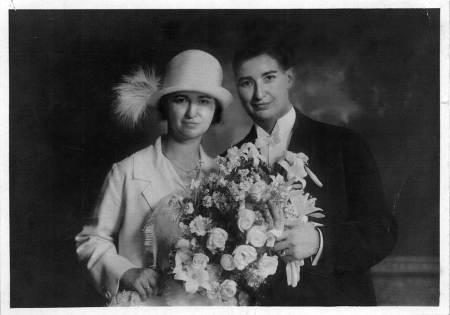
The project was implemented thanks to the grant of the Mayor of Lodz